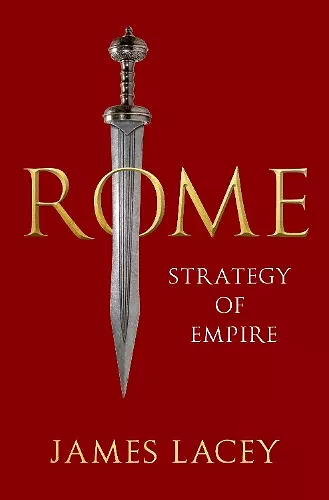Rome
Strategy of Empire
Format:Hardback
Publisher:Oxford University Press Inc
Published:24th Nov '22
Should be back in stock very soon

The first work to lay out Roman strategic thinking from its start under Augustus until its final demise in 476 CE From Octavian's victory at Actium (31 bc) to its traditional endpoint in the West (476), the Roman Empire lasted a solid 500 years—an impressive number by any standard, and fully one-fifth of all recorded history. In fact, the decline and final collapse of the Roman Empire took longer than most other empires even existed. Any historian trying to unearth the grand strategy of the Roman Empire must, therefore, always remain cognizant of the time scale, in which she is dealing. Although the pace of change in the Roman era never approached that of the modern era, it was not an empire in stasis. While the visible trappings may have changed little, the challenges Rome faced at its end were vastly different than those faced by Augustus and the Julio-Claudians. Over the centuries, the Empire's underlying economy, political arrangements, military affairs, and, most importantly, the myriad of external threats it faced were in constant flux, making adaptability to changing circumstances as important to Roman strategists as it is to strategists of the modern era. Yet the very idea of Rome having a grand strategy, or what it might be, had not concerned historians until Edward Luttwak's The Grand Strategy of the Roman Empire appeared forty years ago. Although this pioneering work generated much debate, it failed to win over many ancient historians, in part because of its heavy emphasis on military force and its neglect of considerations of diplomacy, economics, politics, culture, and the changing nature of the threats that confronted Rome. By employing an expansive definition of strategy and by focusing much of the narrative on crucial historical moments and the personalities involved, James Lacey provides a comprehensive, persuasive, and engaging account of the rise and fall of the Roman Empire. It assimilates the most recent work of classical historians and archaeologists to correct the flaws and omissions of previous accounts, thus presenting the most complete and nuanced narrative of Roman strategic thinking and execution ever published.
As an argument about the Roman Empire's ability to conceptualize and maintain an ongoing imperial strategy, the book succeeds and is highly recommended. It reinvigorates and reshapes the debate. * Law & Liberty *
A military history of the Roman Empire with a twist. Using his expertise in strategic operations, [Lacey] makes a compelling argument that the Romans did think and plan strategically in governing.... Highly recommended. * CHOICE *
This well-argued and exhaustively researched book will no doubt reopen the debate as to whether the Romans really were capable of strategic thought. * Military History Matters *
...he[Lacey] writes honest, straightforward English, tells a good story, makes his disagreements with other scholars fairly and clearly and, even if one disagrees with some of his conclusions, the weight of his experience brings a sense of authority to what he writes. His reflections on the modern military world are especially valuable. * Peter Jones, Classics for All *
Engagingly written and logically structured, this is an invaluable contribution to knowledge which moves the discussion far beyond the Luttwak/Isaac debate. The author's practical experience of military planning is brilliantly deployed throughout, and the fact that staff officers effectively use the modern equivalent of Roman itineraries to plan campaign moves is worth a whole book in itself. * Peter Heather, King's College London *
Jim Lacey has already established himself as a major historian of politics and strategy in the twenty-first century. He has now brought his focus to Roman strategy and done so with the critical mind of a first rate strategist. This brilliant work replaces all other examinations of Roman strategy. * Williamson Murray, The Ohio State University *
Drawing on a wealth of ancient and modern material, Lacey succeeds in bringing a fresh perspective to the question of grand strategy in the Roman empire. This book should become mandatory reading for anyone interested in the development of strategic military thought in any age. * David Potter, University of Michigan *
Lacey... concludes that the western empire managed to survive for five centuries despite numerous enemies and environmental challenges because it remained committed to three strategic elements: securing the economic foundations of the empire, maintaining a military force second to none, and having a seemingly inexhaustible supply of soldiers. * New Testament Abstracts *
Lacey also emphasizes the importance of economics to the Roman military machine. * Jesse Russell, The European Conservative *
The facts presented are faultlessly accurate, and the story is told with a warm, almost conversational (albeit completely academic) tone that is insightful, often witty, and completely free of jargon, which allows the story it conveys to be easily understood by the widest possible audience. It contains enough food for thought to satisfy the most strait-laced academic while providing an easily absorbed and engrossing narrative that will be more than palatable to an amateur history enthusiast. It could as easily serve as summer beach reading as for a textbook for a college survey class. It is thus a worthy addition to any library devoted to ancient military history, or to history in general. * Journal of Military History *
- Winner of Shortlisted, 2023 Duke of Wellington Medal, The Royal United Services Institute.
ISBN: 9780190937706
Dimensions: 233mm x 163mm x 37mm
Weight: 776g
448 pages